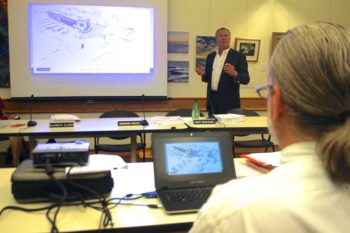Photo: Perkins truck ready to go.
On Wednesday, August 2, Hudson-based E.H. Perkins will begin paving the final section of Winter Street between Concord Avenue and the Lexington town line.
Work will begin at 6 a.m. with the hope of completing the work in one day. The road will be closed, and delays are expected during construction hours between 6 a.m. and 8 p.m. Residents and Commuters are advised to seek alternate routes.
Winter Street residents will not have vehicular access to their homes and properties during work hours.
For any questions or concerns about the project, contact Arthur O’Brian, resident engineer in the Office of Community Development, at 617-993-2665.
